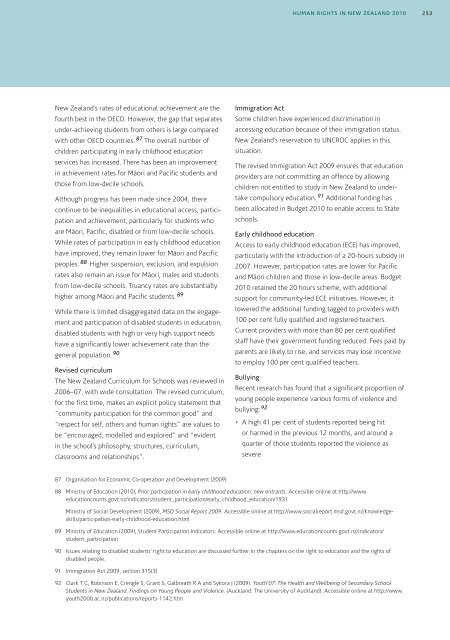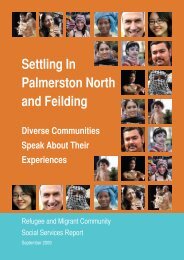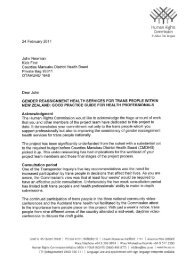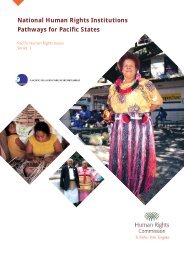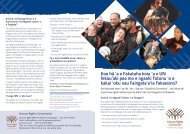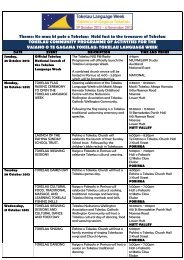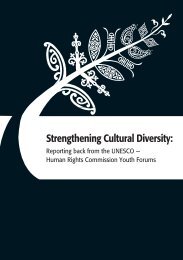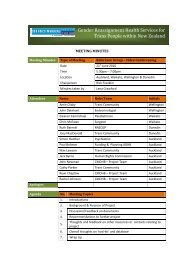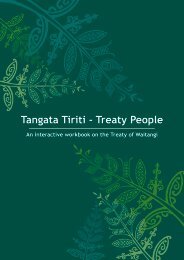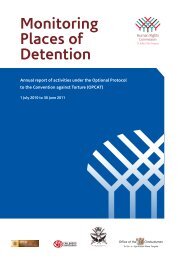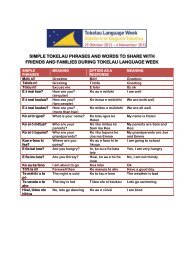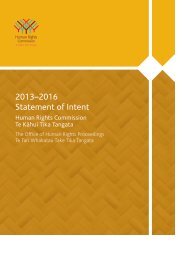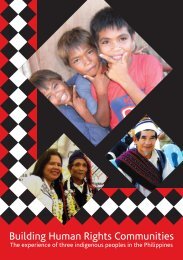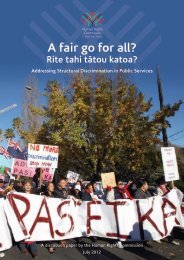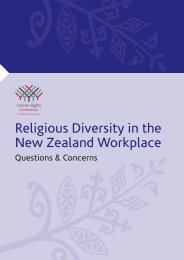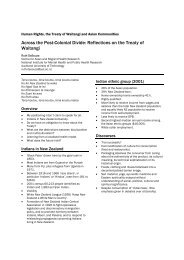16. Rights of Children and Young People - Human Rights Commission
16. Rights of Children and Young People - Human Rights Commission
16. Rights of Children and Young People - Human Rights Commission
You also want an ePaper? Increase the reach of your titles
YUMPU automatically turns print PDFs into web optimized ePapers that Google loves.
HUMAN RIGHTS IN NEW ZEALAND 2010 253<br />
New Zeal<strong>and</strong>’s rates <strong>of</strong> educational achievement are the<br />
fourth best in the OECD. However, the gap that separates<br />
under-achieving students from others is large compared<br />
with other OECD countries. 87 The overall number <strong>of</strong><br />
children participating in early childhood education<br />
services has increased. There has been an improvement<br />
in achievement rates for Mäori <strong>and</strong> Pacific students <strong>and</strong><br />
those from low-decile schools.<br />
Although progress has been made since 2004, there<br />
continue to be inequalities in educational access, participation<br />
<strong>and</strong> achievement, particularly for students who<br />
are Mäori, Pacific, disabled or from low-decile schools.<br />
While rates <strong>of</strong> participation in early childhood education<br />
have improved, they remain lower for Mäori <strong>and</strong> Pacific<br />
peoples. 88 Higher suspension, exclusion, <strong>and</strong> expulsion<br />
rates also remain an issue for Mäori, males <strong>and</strong> students<br />
from low-decile schools. Truancy rates are substantially<br />
higher among Mäori <strong>and</strong> Pacific students. 89<br />
While there is limited disaggregated data on the engagement<br />
<strong>and</strong> participation <strong>of</strong> disabled students in education,<br />
disabled students with high or very high support needs<br />
have a significantly lower achievement rate than the<br />
general population. 90<br />
Revised curriculum<br />
The New Zeal<strong>and</strong> Curriculum for Schools was reviewed in<br />
2006–07, with wide consultation. The revised curriculum,<br />
for the first time, makes an explicit policy statement that<br />
“community participation for the common good” <strong>and</strong><br />
“respect for self, others <strong>and</strong> human rights” are values to<br />
be “encouraged, modelled <strong>and</strong> explored” <strong>and</strong> “evident<br />
in the school’s philosophy, structures, curriculum,<br />
classrooms <strong>and</strong> relationships”.<br />
Immigration Act<br />
Some children have experienced discrimination in<br />
accessing education because <strong>of</strong> their immigration status.<br />
New Zeal<strong>and</strong>’s reservation to UNCROC applies in this<br />
situation.<br />
The revised Immigration Act 2009 ensures that education<br />
providers are not committing an <strong>of</strong>fence by allowing<br />
children not entitled to study in New Zeal<strong>and</strong> to undertake<br />
compulsory education. 91 Additional funding has<br />
been allocated in Budget 2010 to enable access to State<br />
schools.<br />
Early childhood education<br />
Access to early childhood education (ECE) has improved,<br />
particularly with the introduction <strong>of</strong> a 20-hours subsidy in<br />
2007. However, participation rates are lower for Pacific<br />
<strong>and</strong> Mäori children <strong>and</strong> those in low-decile areas. Budget<br />
2010 retained the 20 hours scheme, with additional<br />
support for community-led ECE initiatives. However, it<br />
lowered the additional funding tagged to providers with<br />
100 per cent fully qualified <strong>and</strong> registered teachers.<br />
Current providers with more than 80 per cent qualified<br />
staff have their government funding reduced. Fees paid by<br />
parents are likely to rise, <strong>and</strong> services may lose incentive<br />
to employ 100 per cent qualified teachers.<br />
Bullying<br />
Recent research has found that a significant proportion <strong>of</strong><br />
young people experience various forms <strong>of</strong> violence <strong>and</strong><br />
bullying: 92<br />
• A high 41 per cent <strong>of</strong> students reported being hit<br />
or harmed in the previous 12 months, <strong>and</strong> around a<br />
quarter <strong>of</strong> those students reported the violence as<br />
severe<br />
87 Organisation for Economic Co-operation <strong>and</strong> Development (2009)<br />
88 Ministry <strong>of</strong> Education (2010), Prior participation in early childhood education: new entrants. Accessible online at http://www.<br />
educationcounts.govt.nz/indicators/student_participation/early_childhood_education/1931<br />
Ministry <strong>of</strong> Social Development (2009), MSD Social Report 2009. Accessible online at http://www.socialreport.msd.govt.nz/knowledgeskills/participation-early-childhood-education.html<br />
89 Ministry <strong>of</strong> Education (2009), Student Participation Indicators. Accessible online at http://www.educationcounts.govt.nz/indicators/<br />
student_participation<br />
90 Issues relating to disabled students’ right to education are discussed further in the chapters on the right to education <strong>and</strong> the rights <strong>of</strong><br />
disabled people.<br />
91 Immigration Act 2009, section 315(3)<br />
92 Clark T C, Robinson E, Crengle S, Grant S, Galbreath R A <strong>and</strong> Sykora J (2009). Youth’07: The Health <strong>and</strong> Wellbeing <strong>of</strong> Secondary School<br />
Students in New Zeal<strong>and</strong>. Findings on <strong>Young</strong> <strong>People</strong> <strong>and</strong> Violence. (Auckl<strong>and</strong>: The University <strong>of</strong> Auckl<strong>and</strong>). Accessible online at http://www.<br />
youth2000.ac.nz/publications/reports-1142.htm


